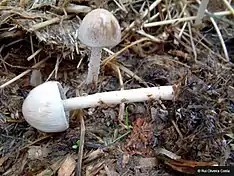Panaeolus semiovatus var. phalaenarum
Panaeolus semiovatus var. phalaenarum is a common and widely distributed medium-sized grey mushroom that grows on dung.
| Panaeolus semiovatus var. phalaenarum | |
|---|---|
 | |
| Scientific classification | |
| Kingdom: | |
| Division: | |
| Class: | |
| Order: | |
| Family: | |
| Genus: | |
| Species: | P. semiovatus var. phalaenarum |
| Binomial name | |
| Panaeolus semiovatus var. phalaenarum (Fr.) Ew.Gerhardt | |
| Synonyms | |
|
Agaricus phalaenarum | |
| Panaeolus semiovatus var. phalaenarum | |
|---|---|
float | |
| gills on hymenium | |
| cap is convex | |
| hymenium is adnexed | |
| stipe has a ring | |
| spore print is black | |
| ecology is saprotrophic | |
| edibility: edible | |
Panaeolus semiovatus var. phalaenarum is often mistaken for Panaeolus semiovatus.
Taxonomy
The binomial Panaeolus antillarum that previously referred to a closely related species, is now reduced to synonymy with Panaeolus semiovatus var. phalaenarum by most authorities.
Description
Panaeolus semiovatus var. phalaenarum is a medium-sized mushroom which has a cap that is 2 to 4 cm, convex, and is white to yellowish. Often mistaken for its larger cousin Panaeolus semiovatus var. semiovatus, from which it differs in being more slender and having no annulus (ring).[1]
This mushroom prefers tropical climates.
See also
References
- Marcel Bon (1987). The Mushrooms and Toadstools of Britain and North Western Europe. Hodder and Stoughton. ISBN 0-340-39935-X.
- Stamets, Paul (1996). Psilocybin Mushrooms of the World. Berkeley: Ten Speed Press. ISBN 0-9610798-0-0.